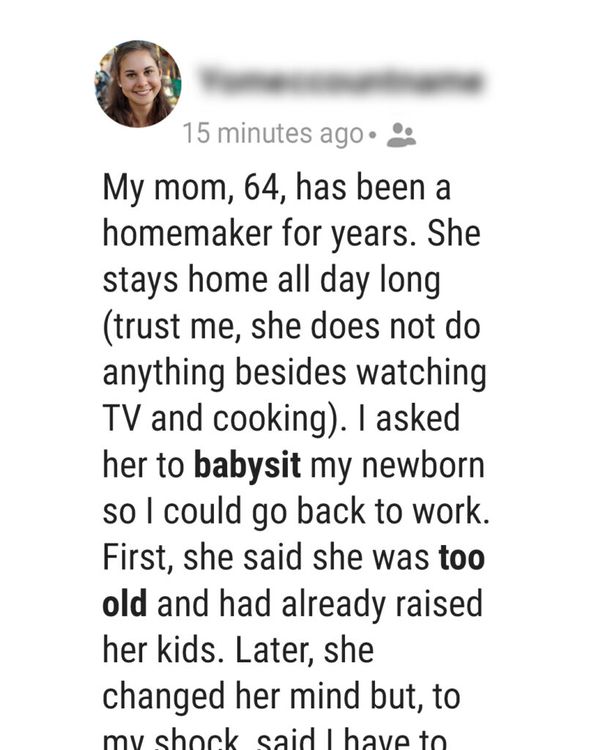A new mother found herself in a predicament when she needed help with her newborn while going back to work. She turned to her 64-year-old mother for support, but things didn’t go as smoothly as she had hoped. The mother asked to be compensated for her babysitting services, which the daughter refused. Let’s dive into the story and see what factors contributed to this conflict.

A Mother in Need of Support
The new mother recently gave birth and was about to resume work. Understandably, she needed someone she could trust to take care of her precious little one. Her first choice was her own mother, who had been a homemaker since 1992. It seemed like the perfect solution, but the mother had reservations about taking on a full-time babysitting job.
The Grandmother’s Perspective
The 64-year-old grandmother felt that she was too old for the task. She believed that she had already raised her own children and no longer wanted the responsibility of full-time childcare. Furthermore, she expressed her opinion that her daughter should have considered staying home if she wanted to have a baby. She and her husband had made that choice years ago, and she felt her daughter and partner should find a way to build a “traditional” family.
Financial Constraints and Living Arrangements
The daughter explained the financial challenges she and her partner were facing. They had just weathered the storm of the pandemic, which took a toll on their finances. The couple’s monthly income was stretched thin, with considerable amounts of debt from student loans, credit cards, car loans, and medical expenses. It was clear that the daughter couldn’t afford to forgo her job. Moreover, they were living in a small one-bedroom apartment and planned to save money to move to a bigger place once the baby grew older. Every penny mattered in their situation.
The Grandmother’s Demands
The grandmother refused to babysit her grandchild without compensation. She requested $20 per hour, including late fees, if they were late to pick up the child. She also asked for a car seat and a stroller. Additionally, she expected reimbursement for driving the child back to her daughter’s house because babysitting from their apartment was not an option. This request was surprising to the daughter, as her mother had only been to their apartment once in the five years they had lived there. Her mother had personal reasons for not wanting to enter their home.
A Dilemma and Conflicting Views
The daughter felt that her mother’s request was unreasonable, especially considering the additional expenses they would have to incur for another car seat and stroller. She wanted to save money to reduce their debt and avoid further financial strain. This difference of opinion caused tension between them. Faced with her mother’s demands, the daughter started considering alternatives, such as an infant care center, which seemed more convenient and cost-effective.
Seeking Perspective from Reddit
Seeking validation and advice, the daughter turned to the Reddit community. She posted her predicament and asked if she was wrong for not wanting to pay her mother for babysitting. Unfortunately, the responses she received were not what she had hoped for. Many people echoed her mother’s sentiments, saying that she should not have had children if she couldn’t afford to take care of them. Some even criticized her for not discussing this arrangement with her mother during her pregnancy, knowing that she would need to go back to work.
Understanding Different Perspectives
It’s important to consider both sides of the argument. The grandmother, now retired, had the right to refuse the offer, as taking care of a child is a demanding job. On the other hand, the daughter and her partner were in a difficult financial situation and desperately needed support. Balancing these conflicting viewpoints is challenging, but open communication and understanding each other’s circumstances can lead to a resolution.
The Value of Family and Support
This story highlights the complexities of family dynamics and the importance of support during life’s challenging moments. It serves as a reminder that, as our loved ones age, their priorities and perspectives may change. Nevertheless, it’s crucial to find a way to navigate these differences with empathy and respect.
Remember, family bonds are precious, and finding common ground can ultimately strengthen those relationships.





